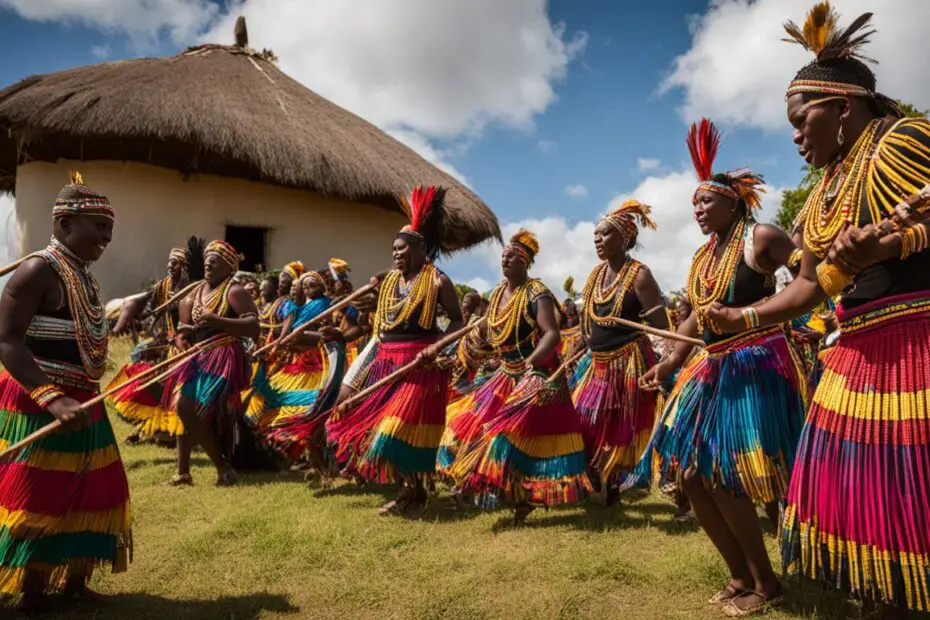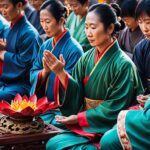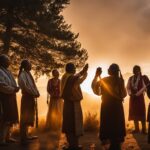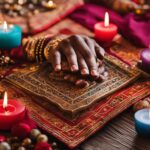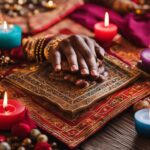Zulu history is deeply intertwined with their religious beliefs and practices. From ancestral reverence to the worship of a supreme being, the Zulu people have a complex and profound spiritual connection. In this article, we will explore the role of ancestors and their worship, the belief in a creator, and the multifaceted nature of the human spirit in Zulu religion.
- Ancestral worship is at the core of Zulu spirituality, with sacrificial offerings being necessary to establish a connection with the ancestors.
- The Zulu people believe in a supreme being called Unkulunkulu, who is revered as the ultimate creator and the ruler of the universe.
- Zulu beliefs recognize the complex nature of the human spirit, with the connection to ancestral spirits being maintained through sacrifices and rituals.
- Sacrifice holds great significance in Zulu religious practices, with different types of sacrifices serving different purposes.
- Despite modern influences, the Zulu people take pride in preserving their spiritual traditions, ensuring the richness of their cultural heritage.
The Ancestral Connection in Zulu Religion
Ancestral worship occupies a central role in Zulu religion, reflecting the deep spiritual connection the Zulu people have with their ancestors. Through the worship of their forebears, the Zulu seek guidance, protection, and blessings from the spiritual realm. Understanding the practices and beliefs surrounding ancestral worship is crucial to comprehending the intricacies of Zulu spirituality.
For the Zulu people, ancestral worship involves the propitiation of their ancestors through sacrificial offerings. These offerings, typically consisting of livestock or agricultural produce, are made to establish a connection with the ancestors and to show respect and gratitude. Sacrificial rituals have been an integral part of Zulu culture for generations, symbolizing the ongoing relationship between the living and the ancestral spirits.
It is believed that through proper ancestral worship, the ancestors can intervene in the lives of the living, providing guidance, protection, and blessings. The Zulu people seek the wisdom and favor of their ancestors in various aspects of life, including marriage, childbirth, and community disputes. The rituals and practices associated with ancestral worship are deeply ingrained in Zulu society, with specific protocols and traditions that are passed down through generations.
| Key Aspects of Ancestral Worship in Zulu Religion |
|---|
| 1. Sacrificial Offerings |
| 2. Connection with Ancestors |
| 3. Seeking Guidance and Blessings |
| 4. Rituals and Traditions |
“Our ancestors guide and protect us, and it is our duty to honor them through worship,” says Nandi Buthelezi, a Zulu elder.
“Through ancestral worship, we maintain a strong bond with our past and ensure the continuity of our cultural heritage. It is a source of strength and comfort for our people.”
With ancestral worship deeply ingrained in their religious and cultural identity, the Zulu people continue to uphold and preserve their spiritual traditions, allowing the ancestral connection to shape their lives and foster a sense of unity and belonging.
Ancestral Worship Rituals
- Preparation of sacrificial offerings
- Offering prayers and invocations to ancestors
- Sacrificial rituals performed by designated spiritual leaders
- Sharing of the sacrificial feast as a communal act
- Distribution of blessings and prayers for the well-being of the community
Unkulunkulu: The Supreme Creator in Zulu Religion
Alongside ancestor worship, the Zulu people also believe in a supreme being called Unkulunkulu. According to Zulu mythology, Unkulunkulu emerged from a bed of reeds and is credited with creating various aspects of the world. He is revered as the ultimate creator and the ruler of the universe. Zulu rituals and worship practices pay homage to Unkulunkulu and seek his blessings.
The worship of Unkulunkulu involves a deep sense of awe and reverence. The Zulu people believe that Unkulunkulu is responsible for the creation of all things and holds the power to bestow blessings and protection upon his followers. Rituals and ceremonies dedicated to Unkulunkulu are carried out to establish a connection with the divine and seek guidance in daily life.
“Unkulunkulu, the creator, is the source of all life and the one who watches over us. We must honor him and seek his favor through our worship and devotion.” – Elder Nkosi
Zulu religion holds that Unkulunkulu is omnipotent, omniscient, and omnipresent. The rituals performed to worship Unkulunkulu often involve offerings and prayers, symbolizing the Zulu people’s gratitude and dependence on the supreme creator. These practices not only serve as a means of seeking divine intervention but also as a way to strengthen the spiritual bond between the Zulu people and Unkulunkulu.
In conclusion, the belief in Unkulunkulu as the supreme creator is an integral part of Zulu religion. The rituals and worship customs associated with Unkulunkulu reflect the deep spiritual connection and reverence the Zulu people have for their creator. By paying homage to Unkulunkulu, the Zulu people seek to honor and seek blessings from the one who brought life into existence.
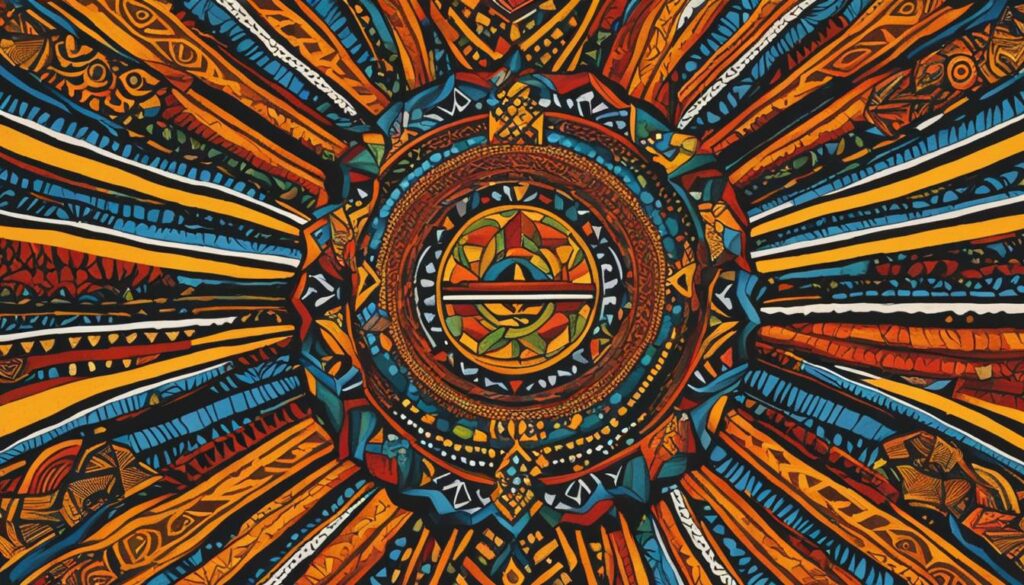
Zulu Religion: The Multifaceted Human Spirit
Zulu beliefs encompass a deep understanding of the complexity of the human spirit. In the realm of Zulu religion, the human spirit is recognized as consisting of various facets, each with its own significance. These facets include the body, soul, heart, brain, and even the shadow. According to Zulu beliefs, the shadow, or personality, transforms into an ancestral spirit after death. This understanding of the human spirit shapes the Zulu people’s spiritual practices and rituals.
The connection with ancestral spirits is maintained through sacrifice and rituals. Sacrificial offerings play a vital role in Zulu worship, allowing for blessings and gratitude. Through these sacrifices, the Zulu people seek to establish a connection with their ancestors and gain their guidance and assistance. It is through this intricate web of spirituality that the Zulu people find solace, guidance, and a sense of belonging.
“The Zulu people have a profound understanding of the human spirit and its connection to the ancestral realm. Through sacrifice and rituals, they honor their ancestors and maintain a spiritual bond that permeates every aspect of their lives.”
Central to Zulu spiritual practices is the recognition of the multifaceted nature of the human spirit. This understanding not only shapes their religious beliefs but also influences their cultural identity. Zulu spirituality is deeply ingrained in their daily lives, passed down through generations, and integrated into their traditions and customs.
The Multifaceted Human Spirit in Zulu Religion
| Facet | Significance |
|---|---|
| Body | Physical vessel through which the spirit experiences the world |
| Soul | Essence of being that transcends the physical realm |
| Heart | Seat of emotions and the center of spiritual connection |
| Brain | Seat of intellect and reasoning, guiding moral choices |
| Shadow | Personality that transforms into an ancestral spirit after death |
The recognition and reverence for the multifaceted human spirit in Zulu religion encapsulates the depth and complexity of their spiritual beliefs. It is a testament to the profound connection the Zulu people have with their ancestors and the divine.
The Power of Sacrifice in Zulu Religion
The Zulu religion places immense importance on the act of sacrifice. Rituals involving sacrifice are deeply ingrained in their worship customs and are believed to establish a connection with the ancestors. Sacrifices are classified into two types: ukubonga, a thanksgiving sacrifice, and ukuthetha, a scolding sacrifice.
Thanksgiving sacrifices, or ukubonga, are performed to express gratitude to the ancestors for their blessings and guidance. These sacrifices are seen as acts of appreciation and are offered when a significant event or achievement occurs in the life of an individual or the community. The Zulu people believe that by offering sacrifices, they can show their reverence to the ancestors and ensure their continued favor and protection.
On the other hand, scolding sacrifices, known as ukuthetha, are performed when there is a need to rectify a wrong or seek guidance in times of difficulty. These sacrifices are seen as a form of discipline, where the ancestors are scolded for not providing adequate assistance or for allowing misfortune to occur. The Zulu people believe that through this scolding, the ancestors will be compelled to intervene and rectify the situation.
In order for the sacrifices to be effective, strict rituals and protocols must be followed. The Zulu people meticulously prepare the sacrificial offerings, which often include livestock or agricultural produce. These offerings are presented to the ancestors in designated areas, such as sacred groves or ancestral altars. Through these sacrifices, the Zulu people seek blessings, protection, and guidance from their ancestors, maintaining a deep connection with the spiritual realm.
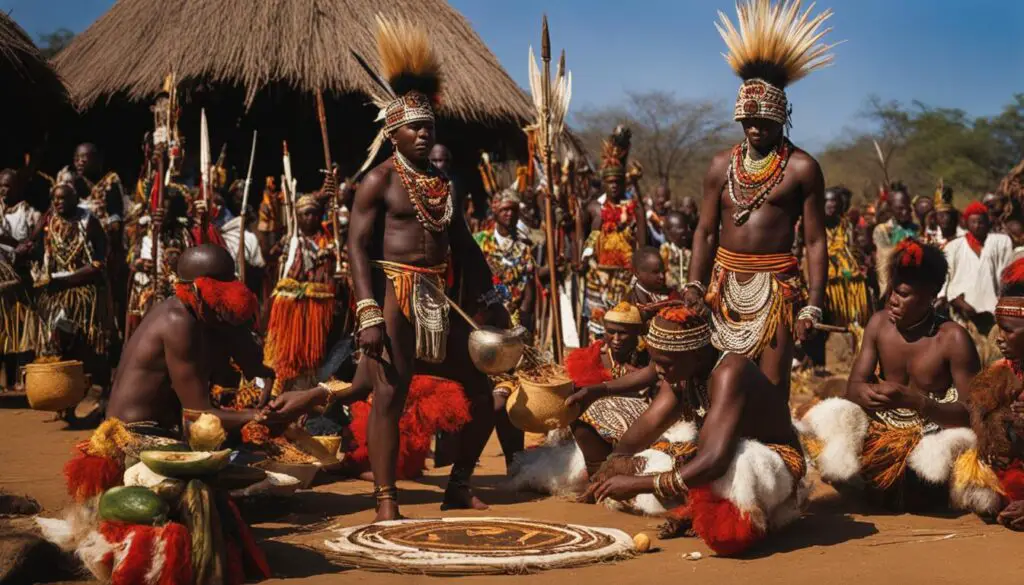
The Significance of Sacrifice in Zulu Religion
“Sacrifice is a sacred act in the Zulu religion, serving as a means to communicate with the ancestors and seek their blessings. It is a way for individuals and communities to express gratitude, seek guidance, and rectify wrongs. Sacrifice is not merely a ritual, but a profound spiritual practice that binds the living and the ancestral realm together.”
The act of sacrifice holds great power in Zulu religion, as it symbolizes the reciprocity between the living and the ancestral spirits. Through sacrifices, the Zulu people believe they can maintain a harmonious relationship with their ancestors and ensure their continued presence and involvement in their lives. It is a testament to their deep-rooted spirituality and their unwavering commitment to upholding their cultural heritage.
| Sacrifice Type | Purpose | Offerings |
|---|---|---|
| Thanksgiving Sacrifice (ukubonga) | To express gratitude and seek blessings | Livestock, agricultural produce |
| Scolding Sacrifice (ukuthetha) | To seek guidance and rectify wrongs | Livestock, agricultural produce |
Religious Transformations in Zulu Culture
The Zulu people have experienced significant religious transformations in the 20th century, as traditional practices merged with elements of Christianity. One notable example is the Ibandla lamaNazaretha, commonly known as the Shembe church, which has gained popularity among rural Zulu communities. This independent church combines Christian principles with ancestral reverence, creating a unique blend of worship and spirituality.
The Shembe church holds regular religious ceremonies that incorporate vibrant song and dance, reflecting the rich cultural heritage of the Zulu people. These ceremonies serve as a form of communal worship, bringing together individuals from the community to celebrate and honor their shared beliefs. The songs and dances performed during these ceremonies are not only spiritual expressions but also expressions of cultural identity and unity.
The attire worn during the Shembe ceremonies is significant as well. Members of the church don traditional beaded garments, which symbolize their commitment to their faith and their connection to their ancestors. These garments are intricately crafted and hold deep cultural and spiritual meaning. Through these religious ceremonies, the Zulu people not only express their devotion but also preserve and pass down their traditional practices to future generations.
Table: Comparing Traditional Zulu Worship and Shembe Ceremonies
| Aspects | Traditional Zulu Worship | Shembe Ceremonies |
|---|---|---|
| Beliefs | Worship of ancestors and Unkulunkulu, the supreme creator | Blend of Christian principles and ancestral reverence |
| Ceremonial Elements | Sacrifices, rituals, and offerings to appease ancestors | Song, dance, and communal worship |
| Attire | Traditional clothing and accessories | Beaded garments symbolizing devotion and cultural identity |
| Community Involvement | Individual and family-based worship | Communal ceremonies bringing together the community |
This comparison highlights the unique elements of Shembe ceremonies and their significance to Zulu culture. The integration of traditional practices with Christian principles allows the Zulu people to maintain their spiritual traditions while adapting to the changing religious landscape. These ceremonies serve as a testament to the resilience and adaptability of Zulu spirituality, ensuring its continuity in the face of modernity.
Preserving Zulu Spirituality
Despite the influences of modernity and the diversification of religious practices, the Zulu people take pride in preserving their spiritual traditions. Zulu spirituality is deeply ingrained in their cultural identity, fostering a profound sense of community and spiritual connection. The rituals, sacrifices, and beliefs are faithfully passed down through generations, ensuring the richness and authenticity of Zulu religious practices.
At the heart of Zulu spirituality is the unwavering belief in the power of ancestral connection. The Zulu people maintain a strong reverence for their ancestors, seeking guidance, protection, and blessings through proper worship. Regular sacrificial offerings and rituals are performed to establish and maintain this vital connection. Through these practices, the Zulu people pay homage to their ancestors and express gratitude for their intercession in their lives.
Zulu traditional worship is not confined to specific religious spaces but is integrated into daily life. Homes are considered sacred spaces where ancestors are honored and worshipped. The importance of community gatherings and ceremonies cannot be overstated as they serve as opportunities for collective worship, bonding, and strengthening of spiritual ties.
The preservation of Zulu spirituality is not limited to rituals and practices alone. It extends to the preservation of cultural artifacts, oral traditions, and the passing down of ancestral knowledge. Through these efforts, the Zulu people ensure that future generations will have a deep understanding and appreciation for their spiritual heritage.
“Zulu spirituality is a living testament to our cultural identity and the profound connection we have with our ancestors. It is through the preservation of our traditions and beliefs that we maintain a strong sense of community and foster spiritual growth.” – Elder Nkosinathi Zulu
The Significance of Traditional Worship
Zulu traditional worship serves as a reminder of the interconnectedness between the physical and spiritual realms. It is a way to honor and acknowledge the role that the ancestors play in the lives of the Zulu people. By participating in rituals and sacrifices, individuals reaffirm their commitment to upholding their ancestral traditions and ensure the continuity of Zulu spirituality for future generations.
| Traditional Worship Practices | Beliefs and Significance |
|---|---|
| Offerings | The act of making offerings symbolizes gratitude and respect towards the ancestors and establishes a connection between the living and the spiritual realm. |
| Divination | Divination is used to seek guidance and gain insight into one’s destiny. It is believed that the ancestors communicate through diviners, providing advice and direction. |
| Dance and Song | Dance and song are integral parts of Zulu worship ceremonies. They serve as a means of expressing devotion, invoking the presence of the ancestors, and creating a spiritually charged atmosphere. |
| Ancestral Altars | Altars dedicated to ancestors are commonly found in Zulu homes. These altars act as focal points for worship, allowing individuals to connect with their ancestors and seek their blessings and protection. |
In conclusion, the Zulu people’s dedication to preserving their spiritual traditions is a testament to the enduring power and significance of Zulu spirituality. Through rituals, sacrifices, and the passing down of ancestral knowledge, Zulu spirituality continues to shape their cultural identity and foster a profound sense of community. The commitment to upholding these traditions ensures that future generations will continue to experience the richness and depth of Zulu religious practices.
Conclusion
Zulu religion holds an extraordinary significance in the lives of the Zulu people. It is a tapestry of ancestral worship, belief in a supreme creator, and reverence for the multifaceted human spirit. These worship practices, rituals, and beliefs are deeply ingrained in their society, providing solace, guidance, and a profound sense of belonging. The preservation of Zulu spirituality ensures the richness of their cultural heritage for generations to come.
The Zulu people’s connection with their ancestors is a pillar of their religious beliefs. Through sacrificial offerings, they establish a profound connection with their forebearers, seeking their wisdom and guidance. Sacrificial rituals have played a vital role throughout Zulu history, as the people express gratitude and seek assistance from their ancestors.
Beyond ancestral worship, the Zulu people also believe in Unkulunkulu, the supreme creator. Zulu rituals and worship practices pay homage to Unkulunkulu, recognizing their creator’s role in shaping the world. Alongside their reverence for ancestors, their belief in Unkulunkulu further strengthens their spiritual connection and fosters a sense of unity among the Zulu community.
Zulu spirituality acknowledges the intricate nature of the human spirit. From the body to the soul, heart, brain, and even the shadow, each aspect holds significance. They believe that the transformation of the shadow into an ancestral spirit after death maintains a connection between the living and the departed. Through sacrifices and rituals, the Zulu people nurture this bond, receiving blessings and expressing gratitude.
FAQ
What is the role of ancestors in Zulu religion?
Ancestors are revered and worshipped in Zulu religion for guidance and assistance.
Who is the supreme being in Zulu religion?
The supreme being in Zulu religion is called Unkulunkulu, the ultimate creator and ruler of the universe.
How do the Zulu people maintain a connection with their ancestors?
The Zulu people maintain a connection with their ancestors through sacrificial offerings and rituals.
What is the significance of sacrifice in Zulu religious practices?
Sacrifice holds great significance in Zulu religious practices as a means to show gratitude and seek favor from the ancestors.
How has Zulu religion been influenced by modernity?
In the 20th century, some Zulu people embraced independent churches that blend Christian principles with ancestral reverence.
Why is it important for the Zulu people to preserve their spiritual traditions?
Preserving their spiritual traditions ensures the richness of their cultural heritage and fosters a sense of community and spiritual connection.


